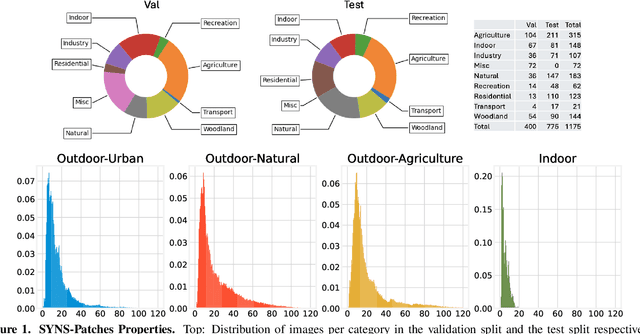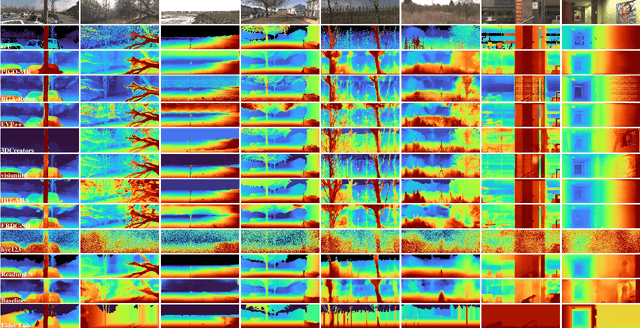Xidan Zhang
$\mathbfΦ$-GAN: Physics-Inspired GAN for Generating SAR Images Under Limited Data
Mar 04, 2025Abstract:Approaches for improving generative adversarial networks (GANs) training under a few samples have been explored for natural images. However, these methods have limited effectiveness for synthetic aperture radar (SAR) images, as they do not account for the unique electromagnetic scattering properties of SAR. To remedy this, we propose a physics-inspired regularization method dubbed $\Phi$-GAN, which incorporates the ideal point scattering center (PSC) model of SAR with two physical consistency losses. The PSC model approximates SAR targets using physical parameters, ensuring that $\Phi$-GAN generates SAR images consistent with real physical properties while preventing discriminator overfitting by focusing on PSC-based decision cues. To embed the PSC model into GANs for end-to-end training, we introduce a physics-inspired neural module capable of estimating the physical parameters of SAR targets efficiently. This module retains the interpretability of the physical model and can be trained with limited data. We propose two physical loss functions: one for the generator, guiding it to produce SAR images with physical parameters consistent with real ones, and one for the discriminator, enhancing its robustness by basing decisions on PSC attributes. We evaluate $\Phi$-GAN across several conditional GAN (cGAN) models, demonstrating state-of-the-art performance in data-scarce scenarios on three SAR image datasets.
Generative Artificial Intelligence Meets Synthetic Aperture Radar: A Survey
Nov 05, 2024



Abstract:SAR images possess unique attributes that present challenges for both human observers and vision AI models to interpret, owing to their electromagnetic characteristics. The interpretation of SAR images encounters various hurdles, with one of the primary obstacles being the data itself, which includes issues related to both the quantity and quality of the data. The challenges can be addressed using generative AI technologies. Generative AI, often known as GenAI, is a very advanced and powerful technology in the field of artificial intelligence that has gained significant attention. The advancement has created possibilities for the creation of texts, photorealistic pictures, videos, and material in various modalities. This paper aims to comprehensively investigate the intersection of GenAI and SAR. First, we illustrate the common data generation-based applications in SAR field and compare them with computer vision tasks, analyzing the similarity, difference, and general challenges of them. Then, an overview of the latest GenAI models is systematically reviewed, including various basic models and their variations targeting the general challenges. Additionally, the corresponding applications in SAR domain are also included. Specifically, we propose to summarize the physical model based simulation approaches for SAR, and analyze the hybrid modeling methods that combine the GenAI and interpretable models. The evaluation methods that have been or could be applied to SAR, are also explored. Finally, the potential challenges and future prospects are discussed. To our best knowledge, this survey is the first exhaustive examination of the interdiscipline of SAR and GenAI, encompassing a wide range of topics, including deep neural networks, physical models, computer vision, and SAR images. The resources of this survey are open-source at \url{https://github.com/XAI4SAR/GenAIxSAR}.
Enhanced Semantic Segmentation Pipeline for WeatherProof Dataset Challenge
Jun 07, 2024Abstract:This report describes the winning solution to the WeatherProof Dataset Challenge (CVPR 2024 UG2+ Track 3). Details regarding the challenge are available at https://cvpr2024ug2challenge.github.io/track3.html. We propose an enhanced semantic segmentation pipeline for this challenge. Firstly, we improve semantic segmentation models, using backbone pretrained with Depth Anything to improve UperNet model and SETRMLA model, and adding language guidance based on both weather and category information to InternImage model. Secondly, we introduce a new dataset WeatherProofExtra with wider viewing angle and employ data augmentation methods, including adverse weather and super-resolution. Finally, effective training strategies and ensemble method are applied to improve final performance further. Our solution is ranked 1st on the final leaderboard. Code will be available at https://github.com/KaneiGi/WeatherProofChallenge.
The Third Monocular Depth Estimation Challenge
Apr 27, 2024



Abstract:This paper discusses the results of the third edition of the Monocular Depth Estimation Challenge (MDEC). The challenge focuses on zero-shot generalization to the challenging SYNS-Patches dataset, featuring complex scenes in natural and indoor settings. As with the previous edition, methods can use any form of supervision, i.e. supervised or self-supervised. The challenge received a total of 19 submissions outperforming the baseline on the test set: 10 among them submitted a report describing their approach, highlighting a diffused use of foundational models such as Depth Anything at the core of their method. The challenge winners drastically improved 3D F-Score performance, from 17.51% to 23.72%.
 Add to Chrome
Add to Chrome Add to Firefox
Add to Firefox Add to Edge
Add to Edge